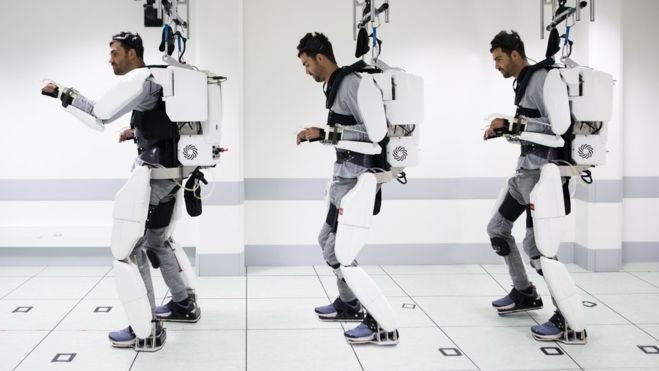Quadriplegic man walks using mind-reading robotic exoskeleton
Robo-suit hailed as huge step forward for paralysed patients

A free daily email with the biggest news stories of the day – and the best features from TheWeek.com
You are now subscribed
Your newsletter sign-up was successful
A man paralysed from the neck down has been able to walk using a mind-reading exoskeleton suit.
The 30-year-old Frenchman, identified in reports only as Thibault, said taking his first steps in the suit felt like being the “first man on the Moon”.
“I didn’t walk for two years. I forgot what it is to stand, I forgot I was taller than a lot of people in the room,” he said.
The Week
Escape your echo chamber. Get the facts behind the news, plus analysis from multiple perspectives.

Sign up for The Week's Free Newsletters
From our morning news briefing to a weekly Good News Newsletter, get the best of The Week delivered directly to your inbox.
From our morning news briefing to a weekly Good News Newsletter, get the best of The Week delivered directly to your inbox.

Two electrodes were implanted on the underside of Thibault’s skull before he was placed in the exoskeleton. These sensors “picked up his brain signals as he thought about moving his legs and beamed the information wirelessly to a computer in a backpack”, which then decoded the signals and passed the instruction on to the suit, says The Times.
The suit also allows Thibault, who broke his neck in a 15-metre fall from a roof four years ago, to move his arms and hands, says New Scientist. This was more challenging than learning how to walk, he said. “It was very difficult because it is a combination of multiple muscles and movements - this is the most impressive thing I do with the exoskeleton.”
His movements are not yet perfect, and the robo-suit is currently used only in a lab setting, where it is connected to a harness to minimise the risk of Thibault falling over, says the BBC.
Professor Alim-Louis Benabid, president of the Clinatec centre which carried out the trial in conjunction with the University of Grenoble, said that while the solution was still “far from autonomous walking”, it was a step in the right direction.
A free daily email with the biggest news stories of the day – and the best features from TheWeek.com
“We have solved the problem and shown the principle is correct. This is proof we can extend the mobility of patients in an exoskeleton,” he said. “This is in the direction of giving better quality of life.”
–––––––––––––––––––––––––––––––For a round-up of the most important stories from around the world - and a concise, refreshing and balanced take on the week’s news agenda - try The Week magazine. Get your first six issues free–––––––––––––––––––––––––––––––
What’s next?
The French scientists developing the exoskeleton technology say that as computer technology and artificial intelligence develop, more and more advanced functions will be possible.
The team’s next goal is to make the exoskeleton self-balancing, says New Scientist. “What we need is higher computation speed – we don’t yet have the reaction time,” Benabid said.
They are also planning to develop individual finger control, which would allow Thibault to pick up and move objects when wearing the suit. He has already used a version of this technology to control a wheelchair.
Tom Shakespeare, a professor at the London School of Hygiene and Tropical Medicine, said the trial was “a welcome and exciting advance”, says Reuters, but cautioned that demonstrating the concept in a lab “is a long way from usable clinical possibility”.
Fears have been raised that exoskeleton technology could one day be applied to far less wholesome uses. The US Army is investing millions of dollars in experimental exoskeleton tech to equip a new generation of “super-soldiers”, says Reuters in a separate report.
But Professor Benabid told the BBC: “We are absolutely not going in the direction of these extreme and stupid applications. Our job is to repair the injured patients who have lost function.”